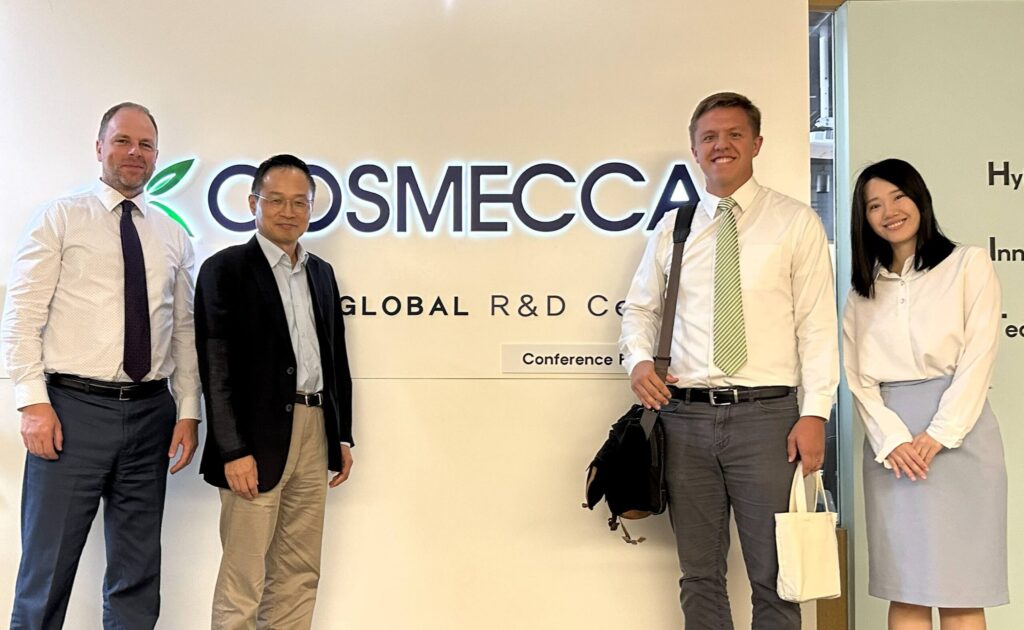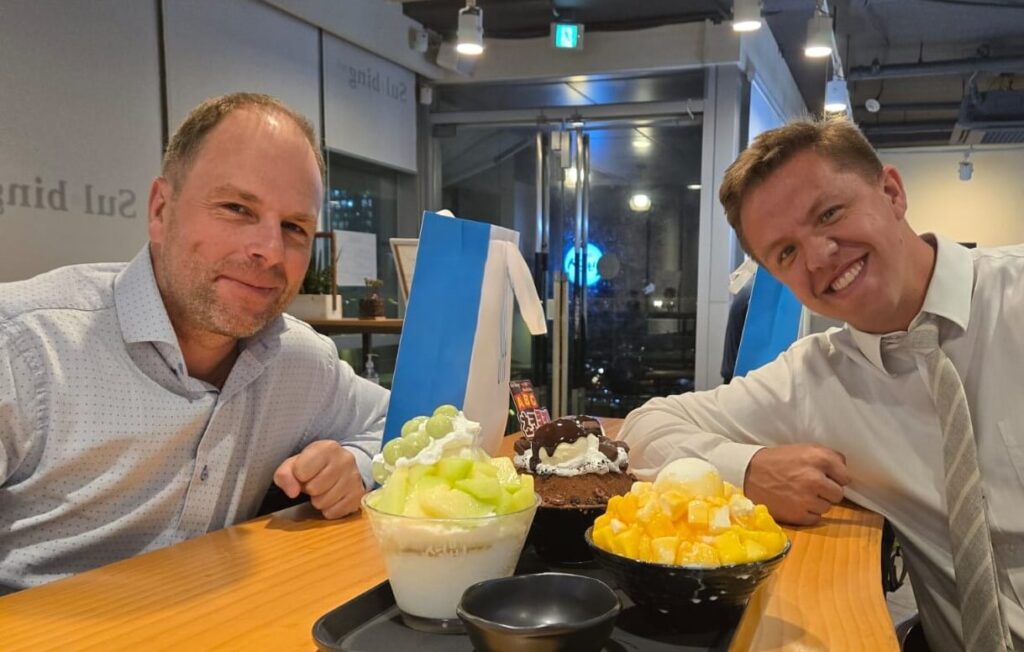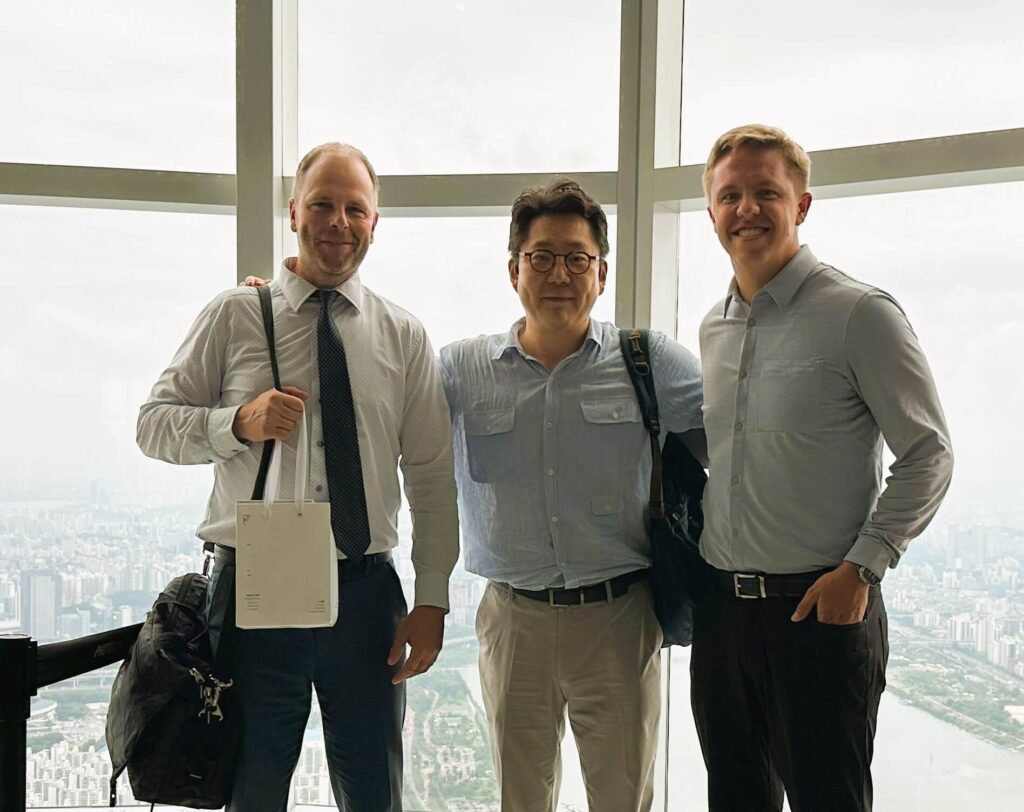Company Touch Tracker
This quarter our team engaged with 388 companies across the world, putting our trailing 12-month company touches at 1,635.
This past quarter, team members traveled domestically to Massachusetts, Texas, Tennessee, California, Illinois, and Missouri. Internationally, team members traveled to Italy, Australia, Sweden, Greece, Belgium, Finland, Denmark, Norway, South Korea, Mexico, China, and Germany.
South Korea Recap
Phil Naylor, Research Analyst and Portfolio Manager, and Blake Walker, Research Analyst, Portfolio Manager, and CEO, traveled to South Korea in September. Here are some of Phil’s thoughts on their research trip.
South Korea still doesn’t feel like an emerging market country. Its cleanliness feels more on par with Japan than India. The infrastructure, with bridges and tunnels nearly everywhere around Seoul, rivals that of any major city. Unfortunately, so does the traffic. The food is clean, diverse, and delicious. South Korea is home to several well-managed, globally known mega-cap companies including Samsung, LG, Hyundai, and Kia[1]. Interestingly, while the IMF (International Monetary Fund)[2], FTSE Russell[3], S&P Dow Jones Indices[4] all classify South Korea as a developed country, MSCI[5] still classifies it as an emerging market. This is, at least in large part, because of the South Korean government’s blanket short-selling ban. The MSCI in June 2024 said, “The recent short-selling ban introduces market accessibility restrictions. While this ban is expected to be temporary, sudden changes in market rules are not desirable.” Regardless of how long this emerging classification lasts, we remain interested in South Korea.

During our trip, we visited 22 companies, focusing primarily on companies that play into the technology value chain and cosmetics. In the technology sector’s value chain, two main challenges stand out for us: (1) finding high-quality companies that don’t carry an excessive amount of customer-specific, idiosyncratic risk, and (2) trusting management teams’ claims. On the first point, the challenge arises because South Korea is dominant in memory-based semiconductor technologies, which has only three main global producers: Samsung Electronics, SK Hynix, and Micron[6]. Another large subset of Korean companies is focused on the mobile handset and display markets, which are both also dominated by a small number of players. Addressing the second challenge, we have learned over the years that South Korean management teams love to sizzle without always delivering the steak. These visits were helpful because they allowed us to meet multiple people and address more questions from different angles – ultimately triangulating what we believe will be the truth.

We left most excited about companies benefiting from brand and technology exports while skirting any risks associated with South Korea’s declining population. In June 2024, President Yoon Suk Yeol declared the low birthrate in South Koreas to be a “demographic national emergency.” The fertility rate fell to 0.72, down from 0.78 last year, significantly below the 2.1 children-per-woman rate needed to maintain the population. Not surprisingly, the number of marriages has also dropped. For context, Japan, which faces its own demographic challenges, had a birthrate of 1.2 in 2023, while China’s was 1.7. The United States sits at 1.6, though it benefits from immigration.
As investors, we find South Korea’s ability to export its brand increasingly appealing. What is the South Korea “brand”?
K-Pop: Psy, BTS, NewJeans, BLɅϽKPIИK – musical groups originating in Korea
K-Drama: SquidGame, Pachinko, Parasite, Crash Landing on You – recent films and television series based on Korean games, cultural references, and soap-opera style dramas
K-Cuisine: Korean BBQ and Bibimbap have long been popular, but more recently concepts like Cupbop, a take-away rice bowl with a variety of toppings, have emerged
K-Beauty: Over 30,000 cosmetic brands – independent and more developed – are growing across the US and beyond.
A decade ago, how many of these were a part of your life? Today, we’re all familiar with at least a few of them. It’s fascinating how South Korea has managed to attach the “K” to so many cultural exports. Has any other country successfully branded such a large portion of its exports? Indeed, the government has included this cultural exporting as a stated goal in hopes of becoming a top global cultural power.

It’s no secret that South Korea is a powerhouse in technology exports. Home to Samsung and Hynix, South Korea has long held a dominant position in memory-based semiconductor technologies. There is an entire ecosystem supporting these businesses. Now, companies that had for many years only sold to producers of legacy memory-based semiconductor technology are expanding into differentiated HBM3e and HBM4 memory, and even into logic-based technologies. Companies who historically focused on displays are now applying their R&D to foldable screens and wearables. Companies who had Intellectual Property (IP) for one technology are creating IP for other adjacent technologies. Much of that innovation ends up outside of South Korea. Despite a tough year for many tech companies, the backlog, and conversations we had suggest this could be a compelling time to invest in certain South Korean tech names. Importantly, we aim to get secular trends right, and based on the earnings power of some of the companies we visited, we walked away from this trip with increased confidence in certain actionable ideas.
On the cosmetics front, we visited established brands, the independent brands, Original Design Manufacturers (ODMs), and distributors. The rise of K-Beauty, driven largely by exports, has led to strong stock performance for many companies over the past year, but we still believe there are good opportunities to find capital appreciation. One company told us they believed the industry was in the 2nd Inning as it related to K-Beauty exports.
Whether South Korea remains classified as Emerging or is full accepted as a Developed country, we continue to be intrigued by the investment opportunities we can find across a variety of sectors.
[1] Grandeur Peak Funds owns zero shares in any of these companies as of July 31, 2024.
[2] The International Monetary Fund (IMF) works to achieve sustainable growth and prosperity for all of its 190 member countries.
[3] FTSE Russell is a subsidiary of London Stock Exchange Group that produces, maintains, licenses, and markets stock market indices.
[4] The S&P Dow Jones Indices is an independent index provider which licenses its products to a global investment market.
[5] MSCI (Morgan Stanley Capital International) is an investment research firm that provides investment data and analytical services to investors, including index products.
[6] Grandeur Peak Funds owns zero shares in any of these companies as of July 31, 2024
